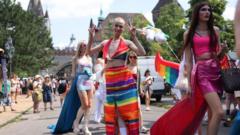In a bold stance against the nationalist government's crackdown on LGBTQ+ rights, Budapest Mayor Gergely Karacsony has vowed that the Pride march on June 28 will take place, despite a police ban citing child protection laws.
**Budapest Pride March Faces Police Ban, Mayor Promises Event Will Proceed**

**Budapest Pride March Faces Police Ban, Mayor Promises Event Will Proceed**
Hungary's Pride march is at the center of a legal showdown as police impose a ban, with the city's liberal mayor determined to move forward with plans for the event.
Police in Budapest have announced a ban on this year's annual Pride march, causing a stir in the city's LGBTQ+ community and raising questions about freedom of assembly. Mayor Gergely Karacsony has countered the police's decree, insisting that a "Day of Freedom" organized by the city hall will go ahead as planned. He expressed his commitment to the event despite Prime Minister Viktor Orban's Fidesz government consistently targeting Pride celebrations in Hungary.
The clash escalated in February when Orban stated that this year’s Pride festivities would not occur and enacted new laws limiting gatherings potentially perceived as violating child protection statutes. Karacsony, utilizing social media, emphasized that the police's attempt to ban the event was unfounded as it falls under the umbrella of civic rights.
Anticipation for the June 28 event remains high, with tens of thousands from Hungary and surrounding areas expected to participate. Karacsony playfully remarked about the absurdity of the police ban, saying, "They might as well try to ban a procession of unicorns."
With the passage of new laws governing public gatherings, those identified as participants through facial recognition technologies could face hefty fines. Fidesz communications chief Tamas Menczer defended the law, asserting that children's safety must take precedence over all other laws.
As tensions mount, human rights organizations like the Rainbow Mission foundation are uniting various events on the same day to show solidarity with the Pride movement, though keeping authorities in suspense about their true intentions. Budapest's Supreme Court has ruled against prior police bans, leaving the door open for a potential rally.
Karacsony has defined the "Day of Freedom" as entirely separate from Pride, promising a family-friendly atmosphere devoid of explicit political or sexual expressions. However, local police maintain their justification for the ban, claiming concerns over potential exposure for minors, regardless of the actual content of participants' displays.
On June 28, advocates say individuals should brace for the possibility of fines and advised those who receive them to contest them either at the police station or in court. Increased participation could deter police from imposing penalties, creating significant delays in the legal system.
As Hungary navigates this charged socio-political landscape, the outcome of the Pride march remains uncertain but symbolizes an ongoing fight for LGBTQ+ rights within a broader narrative defined by dissent against governmental authority.



















